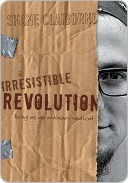More on this book
Kindle Notes & Highlights
All the time, we look at people—hot girls, beggars, pop stars, white folks, black folks, people with suits or dreadlocks. But over time, we can develop new eyes and look into people. Rather than looking at people as sex objects or work tools, we can see them as sacred.
Looking into the eyes of people who love us may be the clearest glimpse of God many of us get in this world.
My studies taught me that the higher a person’s frequency of church attendance, the more likely they are to be sexist, racist, anti-gay, promilitary, and committed to their local church.
We asked people to say the first word that came to mind in response to each word we said: “snow,” “eagles” (it’s Philly), “teenagers,” and finally “Christian.”
As contemporary author and ragamuffin Brennan Manning says, “The greatest cause of atheism is Christians who acknowledge Jesus with their lips, then walk out the door and deny him with their lifestyle.
Not too long ago, I was speaking at Princeton, and some of the students asked me how they were to choose which issue of social justice is the most important. The question made me cringe. Issues? These issues have faces. We’re talking not only about ideas but also about human emergencies. My response to the well-intentioned Princeton students was, “Don’t choose issues; choose people. Come play in the fire hydrants in North Philly. Fall in love with a group of people who are marginalized and suffering, and then you won’t have to worry about which cause you need to protest. Then the issues will
...more
Just as “believers” are a dime a dozen in the church, so are “activists” in social justice circles nowadays. But lovers are hard to come by. And I think that’s what our world is desperately in need of—lovers, people who are building deep, genuine relationships with fellow strugglers along the way, and who actually know the faces of the people behind the issues they are concerned about.
“We can do not great things, only small things with great love. It is not how much you do but how much love you put into doing it.” Above our front door, we have hung a sign that says, “Today…small things with great love (or don’t open the door).”
“The person who loves their dream of community will destroy community [even if their intentions are ever so earnest], but the person who loves those around them will create community.”
We have a God who enters the world through smallness—a baby refugee, a homeless rabbi, the lilies and the sparrows. We have a God who values the little offering of a couple of coins from a widow over the megacharity of millionaires. We have a God who speaks through little people—a stuttering spokesman named Moses; the stubborn donkey of Balaam; a lying brothel owner named Rahab; an adulterous king named David; a ragtag bunch of disciples who betrayed, doubted, and denied; and a converted terrorist named Paul.
As we build our buildings, human temples are being destroyed by hunger and homelessness. The early prophets would say that a church that spends millions of dollars on buildings while her children are starving is guilty of murder. Imagine the scene in a biological family: a father building a mansion while his children are going hungry. He’d be institutionalized or jailed. How much more preposterous should this be in our family of rebirth, in which we have been given new eyes to see others as brothers and sisters?
So as congregations build larger buildings, gyms, and food courts, we find ourselves less likely to meet in homes and kitchens and around dinner tables. We end up centralizing worship on corporate space or “on campus.” Hospitality becomes less of a necessity and more of an optional matter, a convenient privilege. On the other hand, as members open their homes and yards and share vehicles and recreation spaces, less and less corporate property is necessary.
But let me remind us that altar calls originated during the fiery revivals of nineteenth-century evangelists like Charles Finney. The reason they gave them was to register new converts for the antislavery movement. They were not simply calling people forward to become believers; they were calling people forward to join a movement of ordinary radicals. On the altar, belief and action kissed, and extremists for love were born.


